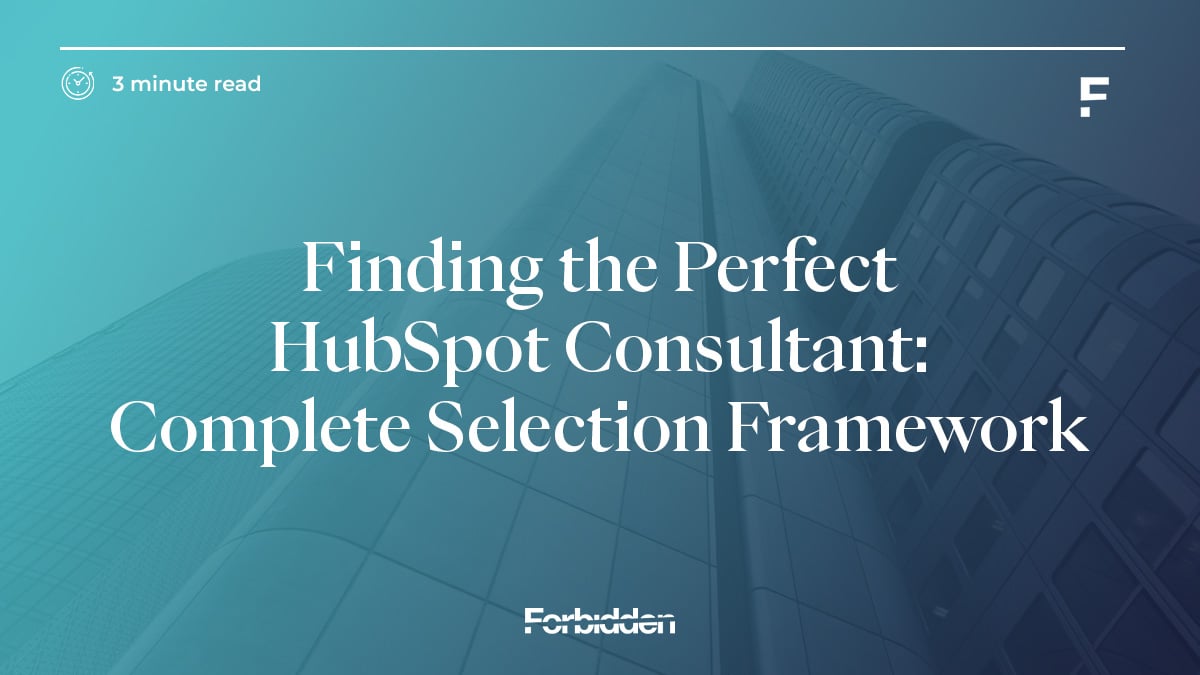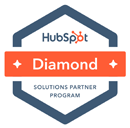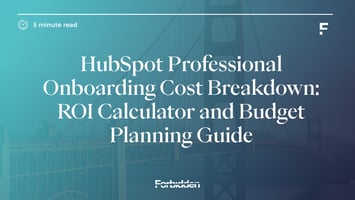Finding the Perfect HubSpot Consultant: Complete Selection Framework

Finding the right HubSpot consultant can be the difference between a smooth, high-impact rollout and a painful, underperforming platform. Whether you’re implementing HubSpot for the first time or looking to optimise an existing setup, the right consultant brings structure, speed, and strategy to your growth engine.
This guide breaks down every stage of the selection process from understanding consultant service types and assessing capabilities to using structured interview frameworks, evaluation templates, and best practices to ensure a successful, long-term engagement.
HubSpot Consultant Service Types
HubSpot consultants come with varying specialisations, and understanding what you actually need before starting your search prevents wasted time and budget. Below are the five core consulting service types you’ll typically encounter, each designed to tackle different growth challenges.
Inbound Strategy & Planning
These consultants focus on the “why” behind your HubSpot setup. They help define buyer personas, customer journeys, content strategies, and campaign architecture to ensure your HubSpot platform aligns with your commercial goals. Expect deliverables like content calendars, lead nurture maps, and funnel gap analyses.
Technical Implementation Services
Technical consultants handle the “how.” They configure Hubs, build workflows, integrate CRMs or ERPs, and create reporting dashboards that match your sales and marketing infrastructure. They’re ideal for businesses with complex data systems or limited internal technical capacity.
Team Training & Development
Even the best HubSpot implementation fails without adoption. Training-focused consultants specialise in onboarding teams, running workshops, and embedding platform confidence across departments. Their focus is on building in-house capability rather than dependency.
Data Migration & Transition Support
These specialists manage the sensitive process of transferring data from legacy systems into HubSpot. They ensure data integrity, standardisation, and compliance (GDPR, ISO, etc.) while preventing downtime and lost records which are critical for larger or regulated organisations.
Advanced Customisation & Technical Consulting
For enterprise or scaling teams, technical consultants go deeper into CRM customisation. They can develop custom objects, create complex workflows, or connect external APIs. These consultants are often part of your long-term RevOps or optimisation strategy.
Consultant Evaluation Methodology
Selecting a HubSpot consultant requires more than reviewing testimonials. You need a structured methodology that evaluates expertise, fit, and ROI potential objectively.
Here’s how to approach it:
Key Interview Questions
Ask targeted, open-ended questions to uncover real-world experience and problem-solving ability:
-
“What’s your approach to improving adoption across multiple teams?”
-
“Can you walk me through a complex HubSpot project you’ve delivered?”
-
“How do you handle data migration from multiple systems?”
-
“What metrics do you use to measure project success?”
Look for consultants who speak in business outcomes, not just HubSpot features.
Industry Expertise Assessment
A consultant familiar with your sector understands the nuances of your sales cycle, lead sources, and compliance requirements. Assess:
-
Relevant case studies in your industry
-
Familiarity with your buyer journey
-
Understanding of your sales or service model
If you’re in a niche or regulated sector, this alignment is non-negotiable.
Customisation Capability Checklist
HubSpot’s flexibility is its strength but, only if your consultant knows how to wield it. Evaluate their technical expertise against your needs:
-
Workflow automation
-
Custom object creation
-
Reporting and dashboard setup
-
Third-party integrations
-
CMS and content personalisation
This ensures your consultant can scale the platform alongside your business growth.
ROI Potential & Risk Mitigation
The right consultant should be able to justify their cost with measurable ROI projections; reduced manual hours, increased lead flow, faster reporting cycles. Ask for:
-
Estimated time-to-value metrics
-
Example ROI from previous clients
-
Contingency plans for missed milestones
It’s not just about saving money, it’s about maximising impact.
Selection Tools & Templates
Once you’ve shortlisted potential consultants, structured evaluation tools keep your decision objective and data-driven.
RFP & Proposal Templates
A well-crafted RFP (Request for Proposal) clarifies your expectations, scope, and success criteria. It should include:
-
Current HubSpot setup summary
-
Desired outcomes
-
Technical integrations
-
Timeframe and budget range
Request comparable proposals so evaluation remains like-for-like.
Consultation Evaluation Sheets
Use scoring templates to rank consultants against key categories:
-
Technical competence
-
Strategic alignment
-
Communication clarity
-
Industry experience
-
Cost efficiency
This provides a clear visual comparison across multiple candidates.
Contract Negotiation Guidelines
Contracts should balance accountability and flexibility. Ensure you clarify:
-
Deliverables and timelines
-
Review milestones
-
IP ownership
-
Exit clauses
A transparent agreement prevents misunderstandings later on.
Performance Measurement Frameworks
Agree on what success looks like from the start. Common KPIs include:
-
User adoption rate
-
Workflow efficiency gains
-
Lead conversion rate improvements
-
Data accuracy percentage
Document these metrics to make future performance reviews objective and data-driven.
Success Stories & Best Practices
Once you’ve chosen your HubSpot consultant, maintaining a healthy relationship is the key to long-term success. This section shares proven strategies from successful partnerships and the pitfalls to avoid.
Case Studies of Successful Engagements
The most productive partnerships typically share three traits:
-
Clear ownership - Both client and consultant know their responsibilities.
-
Regular communication - Scheduled check-ins keep projects aligned.
-
Iterative delivery - Success builds through ongoing optimisation, not one-off projects.
Common Pitfalls & How to Avoid Them
Avoid consultants who:
-
Overpromise timelines
-
Lack a structured onboarding plan
-
Push generic “template” solutions
-
Avoid data accountability
A strong consultant is transparent about what’s achievable and the effort required.
Long-Term Consultant Relationship Management
Treat your consultant as an extension of your team, not just a supplier. Foster collaboration by:
-
Sharing access to strategy documents
-
Involving them in quarterly reviews
-
Encouraging proactive recommendations
This ensures continuous improvement and alignment with business evolution.
Continuous Improvement Strategies
Post-implementation, your consultant should help drive refinement; improving automation, reporting, and data insights. Build an ongoing improvement roadmap together to keep momentum and ROI high.
Closing Thoughts: Turning Consultation into Competitive Advantage
Choosing the right HubSpot consultant isn’t about finding the cheapest or fastest option - it’s about securing a long-term partner who understands your commercial goals and helps you achieve them efficiently.
By following a structured selection process, asking the right questions, and using practical templates and benchmarks, you’ll avoid costly misalignment and instead unlock HubSpot’s full potential as a scalable, growth-driving platform.
Ready to make HubSpot work for your business? Let's talk about how we can help you avoid the pitfalls and fast-track your path to results.











